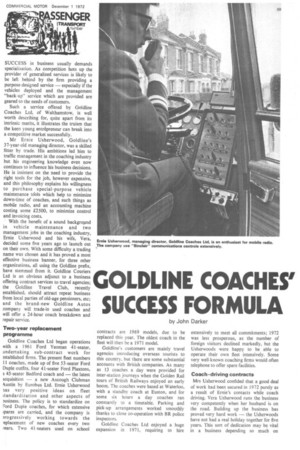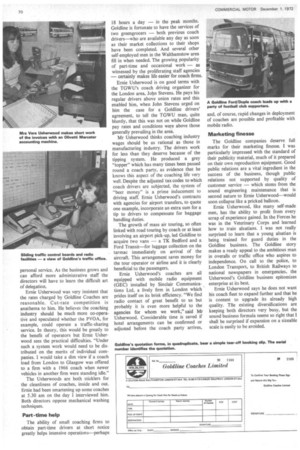GOLDLINE COACHES' SUCCESS FORMULA
Page 71

Page 72

If you've noticed an error in this article please click here to report it so we can fix it.
by John Darker SUCCESS in business usually demands specialization. As competition hots up the provider of generalized services is likely to be left behind by the firm providing a purpose-designed service — especially if the vehicles deployed and the management "back-up" service which are provided are geared to the needs of customers.
Such a service offered by Goldline Coaches Ltd, of Walthamstow, is well worth describing for, quite apart from its intrinsic merits, it illustrates the truism that the keen young entrepreneur can break into a competitive market successfully.
Mr Ernie Usherwood, Goldline's 37-year-old managing director, was a skilled fitter by trade. His ambitions led him to traffic management in the coaching industry but his engineering knowledge even now continues to influence his business decisions. He is insistent on the need to provide the right tools for the job, however expensive, and this philosophy explains his willingness to purchase special-purpose vehicle maintenance tdols which help to minimize down-time of coaches, and such things as mobile radio, and an accounting machine costing some £2500, to minimize control and invoicing costs.
With the benefit of a sound background in vehicle maintenance and two management jobs in the coaching industry, Ernie Usherwood and his wife, Vera, decided some five years ago to launch out on their own. With some difficulty a trading name was chosen and it has proved a most effective business banner, for three other organizations, all using the Goldline prefix, have stemmed from it. Goldline Couriers Ltd is an obvious adjunct to a business offering contract services to travel agencies; the Goldline Travel Club, recently established, should attract repeat business from local parties of old-age pensioners, etc; and the brand-new Goldline Autos company will trade-in used coaches and will offer a 24-hour coach breakdown and repair service.
Two-year replacement programme
Goldline Coaches Ltd began operations with a 1961 Ford Yeoman 41-seater, undertaking sub-contract work for f.tstablished firms. The present fleet numbers 11 coaches, made up of five 53-seater Ford Duple outfits, four 41-seater Ford Plaxtons, a 45-seater Bedford coach and — the latest acquisition — a new Ascough Clubman Austin by Eurobus Ltd. Ernie Usherwood las very positive ideas on fleet ;tandardiiation and other aspects of 'usiness. The policy is to standardize on Ford Duple coaches, for which extensive ;pares are carried, and the company is 'regressively working towards the .eplacement of new coaches every two Tears. Two 41-seaters used on school
contracts are 1969 models, due to be replaced this year. The oldest coach in the fleet will then be a 1971 model.
Goldline's customers are mainly travel agencies introducing overseas tourists to this country, but there are some substantial accounts with British companies. As many as 13 coaches a day were provided for inter-station journeys when the Golden Rail tours of British Railways enjoyed an early boom. The coaches were based at Waterloo, with a standby coach at Euston, and for some six hours a day coaches ran constantly CO a timetable. Parking and pick-up arrangements worked smoothly thanks to close co-operation with BR police inspectors.
Goldline Coaches Ltd enjoyed a huge expansion in 1971, requiring to hire extensively to meet all commitments; 1972 was less prosperous, as the number of foreign visitors declined markedly, but the Usherwoods were happy to be able to operate their own fleet intensively. Some very well-known coaching firms would often telephone to offer spare facilities.
Coach-driving contracts Mrs Usherwood confided that a good deal of work had been secured in 1972 purely as a result of Ernie's contacts while coach driving. Vera Usherwood runs the business very competently when her husband is on the road. Building up the business has proved very hard work — the Usherwoods have not had a real holiday together for five years. This sort of dedication may be vital in a business depending so much on personal service. As the business grows and can afford more administrative staff the directors will have to learn the difficult art of delegation.
Ernie Usherwood was very insistent that the rates charged by Goldline Coaches are reasonable. Cut-rate competition is anathema to him. He believes the coaching industry should be much more co-operative and speculated whether the PVOA, for example, could operate a traffic-sharing service. In theory, this would be greatly to the benefit of operators but Ernie Usherwood sees the practical difficulties. "Under such a system work would need to be distributed on the merits of individual companies. I would take a dim view if a coach load from London to Glasgow was offered to a firm with a 1966 coach when newer vehicles in another firm were standing idle."
The Usherwoods are both sticklers for the cleanliness of coaches, inside and out. Ernie had been smartening up some coaches at 5.30 am on the day I interviewed him. Both directors oppose mechanical washing techniques. 18 hours a day — in the peak months. Goldline is fortunate to have the services of two greengrocers — both previous coach drivers—who are available any day as soon as their market collections to their shops have been completed. And several other self-employed men in the Walthamstow area fill in when needed. The growing popularity of part-time and occasional work — as witnessed by the proliferating staff agencies — certainly makes life easier for coach firms.
Ernie Usherwood is on good terms with the TGWU's coach driving organizer for the London area, John Stevens. He pays his regular drivers above union rates and this enabled him, when John Stevens urged on him the case for a Goldline drivers' agreement, to tell the TGWU man, quite bluntly, that this was not on while Goldline pay rates and conditions were above those generally prevailing in the area.
Mr Usherwood thinks coaching industry wages should be as rational as those in manufacturing industry. The drivers work for less than they deserve because of the tipping system. He produced a grey "topper" which has many times been passed round a coach party, as evidence that he knows this aspect of the coaching life very well. Despite the adjusted tax codes to which coach drivers are subjected, the system of "beer money" is a prime inducement to driving staff. Ernie Usherwood's contracts with agencies for airport transfers, to quote one example, incorporate an extra sum for a tip to drivers to compensate for baggage handling duties.
The growth of mass air touring, so often linked with road touring by coach or at least involving an airport pick-up, led Goldline to acquire two vans — a TK Bedford and a Ford Transit—for luggage collection on the tarmac immediately on arrival of the aircraft. This arrangement saves money for the tour operator or airline and it is clearly beneficial to the passengers.
Ernie Usherwood's coaches are all equipped with mobile radio equipment (GEC) installed by Sinclair Communications Ltd, a lively firm in London which prides itself on its brisk efficiency. "We find radio contact of great benefit to us but probably it is even more helpful to the agencies for whom we work," said Mr Usherwood. Considerable time is saved if hotel arrangements can be confirmed or adjusted before the coach party arrives, and, of course, rapid changes in deployment of coaches are possible and profitable with mobile radio.
Marketing finesse The Goldline companies deserve full marks for their marketing finesse. I was particularly impressed with the standard of their publicity material, much of it prepared on their own reproduction equipment. Good public relations are a vital ingredient in the success of the business, though public relations not supported by quality of customer service — which stems from the sound engineering maintenance that is second nature to Ernie Usherwood—would soon collapse like a pricked balloon.
Ernie Usherwood, like many self-made men, has the ability to profit from every scrap of experience gained. In the Forces he was in the Veterinary Corps and learned how to train alsatians. I was not really surprised to learn that a young alsatian is being trained for guard duties in the Goldline business. The Goldline story makes a ready appeal to the ambitious man in overalls or traffic office who aspires to independence. On call to the police, to London Transport, to British Railways to national newspapers in emergencies, the Usherwood's Goldline business epitomizes enterprise at its best.
Ernie Usherwood says he does not want his coach fleet to expand further and that he is content to upgrade its already high quality. The existing diversifications are keeping both directors very busy, but the sound business formula seems so right that I shall be surprised if expansion on a sizeable scale is easily to be avoided.
































































































































